|
|
|
Sort Order |
|
|
|
Items / Page
|
|
|
|
|
|
|
| Srl | Item |
| 1 |
ID:
184193
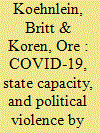

|
|
|
|
|
| Summary/Abstract |
The COVID-19 pandemic has constrained the ability of states across the world to govern and control their territories. As the state reduces its activities, space opens for violent non-state actors working for and against the state to fill the vacuum. Highlighting this trend, the present study evaluates the effects of COVID-19 and pandemics more broadly on attacks by non-state actors. Our theory emphasizes the incentives of both rebels and pro-government non-state actors (PGNs) to increase their attack frequency as disease spreads and the state retracts its governance activities to preserve resources needed elsewhere. In the first case, we highlight how the pandemic allows rebels to reduce asymmetries of power with respect to the military and establish themselves as a viable government alternative. In the second case, PGNs, which provide an alternative to militaries, are deployed to these contested spaces to thwart or pre-empt rebellion during the pandemic. Employing daily-level data on the annual change in armed conflict and COVID-19 cases across 127 countries between 1 January 2020 and 15 June 2020, we test both claims using an econometric identification strategy. We do not find clear evidence that COVID-19 led to a higher frequency of rebel attacks, suggesting that these groups prefer to bolster their standing using nonviolent means, or avoid fighting and preserve their resources. In contrast, we find that the frequency of PGN attacks has increased with COVID-19 prevalence compared with last year. Case studies of insurgent and PGN activity in Afghanistan and Nigeria lend additional support to these results, illustrating some underlying mechanisms. Our findings explore overlooked challenges that pandemics and other disasters pose to conflict mitigation and the role PGNs play in these contexts.
|
|
|
|
|
|
|
|
|
|
|
|
|
|
|
|
| 2 |
ID:
178647
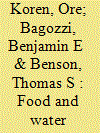

|
|
|
|
|
| Summary/Abstract |
Research often fails to account for the specific pathways by which climatic factors can cause social unrest. One challenge lies in understanding the distinct effects of food insecurity and water insecurity – which we term ‘staple insecurities’ – while accounting for their interrelated nature, especially at high-resolution spatio-temporal scales. To unpack these dynamics, we leverage geolocated Twitter data across urban areas in Kenya and deploy a supervised machine learning approach to separately identify geolocated tweets concerning food and water insecurity, in both English and Swahili. The data are then aggregated to create daily measures of food and water insecurity for standardized grid-cells to examine how perceived food insecurity moderates and/or reinforces perceived water insecurity’s impacts on social unrest, and vice versa. Our findings suggest that food and water insecurities’ respective effects should be interpreted as mutually reinforcing – in compelling citizens to take to the streets – rather than as independent. Those concerned with climate change’s impact on conflict should hence endeavor to jointly account for both forms of insecurity, and their interactive effects.
|
|
|
|
|
|
|
|
|
|
|
|
|
|
|
|
| 3 |
ID:
170193
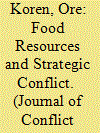

|
|
|
|
|
| Summary/Abstract |
A growing number of studies draw linkages between violent conflict and food scarcities. Yet, evidence suggests that within states, conflict revolves around food resources abundance. I develop an explanation for how the competition over food resources conditions the strategic behaviors of three actors: rebels, civilian producers who grow crops, and state forces. Using a statistical-strategic model, I validate my theory at the subnational level on new high specificity spatial data on staple crop access and productivity in Africa for the years 1998 to 2008 (and use the estimates to forecast conflict on out-of-sample data for 2009 to 2010). In line with theoretical expectations, local variations in food productivity have a positive, statistically significant, and substantive effect on the strategic behaviors of different actors. These findings suggest that the imperative for food denial as a microlevel tactic in civil war should be more seriously incorporated into the work of scholars and policy makers.
|
|
|
|
|
|
|
|
|
|
|
|
|
|
|
|
| 4 |
ID:
193077
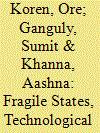

|
|
|
|
|
| Summary/Abstract |
Research on terrorism disagrees on whether terrorist activity is at its highest in collapsed states, which are more hospitable to such activities, or whether terrorism increases in more capable states. We revisit this discussion by theorizing an interactive relationship: terrorists prefer to operate in politically-hospitable states, but their attack frequency within these states increases with greater technological capacity, which allows them to expand their military, recruitment, and financing operations. We analyze 27,018 terrorist incidents using regression and causal inference models, conduct a case study, and find robust support for this interactive logic. Our conclusions outline implications for policy and academic work.
|
|
|
|
|
|
|
|
|
|
|
|
|
|
|
|
| 5 |
ID:
133544
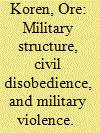

|
|
|
|
|
| Publication |
2014.
|
| Summary/Abstract |
In this article, I argue that factors inherent to the structure of a military organization and their relationship with the political leadership play a role in the organization's tendency to perpetrate violence against civilians during civil disobedience campaigns. To examine this hypothesis, I conducted a three-phased statistical analysis on a database containing 97 campaigns that took place between 1972 and 2012. In the first phase, I examined the relationship between military centric factors and violent crackdowns. In the second phase, I examined the relationship between military centric factors and mass killing. In the third stage, I examined the relationship between two specific types of discrimination in the military and mass killing. I found strong evidence supporting the hypothesis mentioned above. High-risk militaries that served a militarized regime, contained loosely regulated or indoctrinated paramilitaries, and discriminated against the protesting group, were much more likely to perpetrate violence against civilians during civil disobedience campaigns than low-risk militaries. The conclusions of this study suggest that further examination of the military's role in perpetrating violence against civilians during protests and conflict may provide some novel findings.
|
|
|
|
|
|
|
|
|
|
|
|
|
|
|
|
|
|
|
|
|